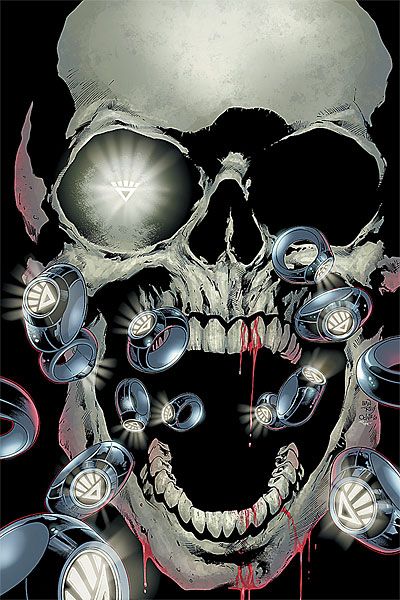Geoff Johns and Ivan Reis have told some excellent Green Lantern stories over the past few years. Johns's effective brand of long-term plotting and Reis's illustrative post-Neal Adams artwork has made "Green Lantern" the most reliably good DC monthly during that time -- it's very different from what Ed Brubaker and friends have been doing with "Captain America," but it serves a similar purpose within each company's lineup. "Green Lantern" is the bedrock of the DCU, and while books like "Action Comics" and "Batman" have rapidly shifted in quality during this volume's run, "Green Lantern" has remained steadily quite good, escalating toward the Sinestro Corps War ever since the first issue hit the stands and then setting up the War of Light ever since. Even the "Secret Origin" arc was an attempt to retell Hal Jordan's story while setting up future plotlines and relationships that will surely pay off in "Blackest Night."
So there's certainly no doubt about Johns and Reis's credentials when it comes to telling epic superhero space opera with a dose of underlying humanity. But here's a potential problem with "Blackest Night," and it's a problem that is all-too apparent in the first issue: because this is, at its core, a continuation of the larger Green Lantern story, and because Johns has escalated that story to such dramatic heights that its reached a level of absurdity -- well, "Blackest Night" #1 reads as a bit excessive. More than a bit, perhaps. More like excessively excessive.
It has the ring of a Brad Meltzer comic to it -- too overwrought, too overburdened by outrageous melodrama, too much grave despair in the face of overwhelming odds. But there's a spark of joy to the grimness that "Identity Crisis" and "DCU: Last Will and Testament" lacked, and its that spark of joy -- that spark of "hey, this is outrageously excessive, but isn't it fun?" that makes this comic work. And for what it is -- for a DC epic-level summer event -- it works very well.
Yes, the burdens of heroism are heavy, and Johns spends a bit too much time checking in with various heroes mourning their fallen comrades (practically half the pages of the first issue are devoted to scenes of heroes talking about those who have died in the wars between the superheroes and supervillains), but it's all in service of what is a gloriously excessive concept: the dead have arisen, and these zombie heroes and villains are on the offensive.
It's a bit reminiscent of Paul Levitz and Keith Giffen's legendary "Great Darkness Saga," a story arc that Johns -- as a deeply devoted Legion of Super-Heroes fan -- would remember well. In that story, Darkseid had created evil, blackened doppelgangers of great heroes of the past, and it was chilling to see the teen heroes of the future fight corrupted representations of great heroes of our day. Then there was the moment when the entire population of Daxam (all with the powers of Superman) rose up from their planet in the thrall of the dark lord. Yes, that was an excessive storyline too, and Johns uses many of the same stylistic tricks (with a 21st century spin) that Levitz used all those years ago: quick cutting between teams of heroes, mysterious motivations and unbearably horrific forces of darkness, a sense of real tragedy, and the glimmer of hope that somehow the heroes will overcome the odds.
This is a grim first issue, but its grimness is in the service of a story that is about the role of death in the DCU. Perhaps Johns will explore the consequences of hero and villain deaths in some meaningful way, or perhaps this is the beginning of nothing more than a summer blockbuster full of horrific bad guys and noble heroes. Either way, this first issue boldly establishes that this will be a story to remember. It's excessive, but it needs to be to seem like it matters. And its excesses are part of its charm.

